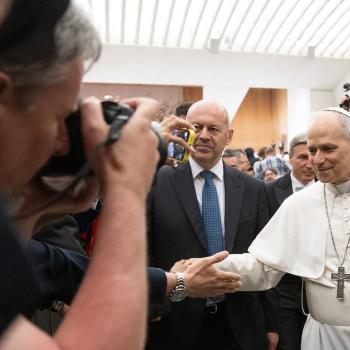This month, we welcomed two new people into our congregation. (Latter-day Saints call their congregations wards, because our wards, like Catholic parishes, are organized geographically.) One of those we welcomed was a recent convert, baptized on Saturday and confirmed on Sunday. The other was a baby born several weeks ago and brought to church to be given a name and a blessing on the first Sunday of the month.
Among Mormon scriptures is a set of revelations received by Joseph Smith and other latter-day prophets, the Doctrine and Covenants. (Our scriptures also include the Bible, the Book of Mormon, and the Pearl of Great Price.) Doctrine and Covenants 20:70 says, "Every member of the church of Christ having children is to bring them unto the elders before the church, who are to lay their hands upon them in the name of Jesus Christ, and bless them in his name."
When a child is born into an LDS family, the common practice is to bring that baby to a fast and testimony meeting, held on the first Sunday of the month. That day is a day of fasting for us, and in our worship service we allow members of the congregation to bear witness—testimony—of the Gospel in place of sermons. Blessings of babies can be done on other Sundays, but usually they are done on Fast Sunday.
A person who holds the Melchizedek Priesthood (the higher of our two priesthood orders), usually the father, stands in a circle with other priesthood holders. They hold the baby and say a prayer in which they first give the child a name and then a blessing. After the blessing the father will often hold up the baby, sometimes dressed as if for a christening, for the congregation to see—and to provoke a few quiet oohs and ahs from the congregants. Members of the baby's extended family who are able usually attend the service, and there is often a celebratory family get-together and meal after worship services.
This rite—ordinance in Mormon terms—isn't required. We don't practice infant baptism. That's not what infant blessings are about. Convert children who are no longer infants are not usually given such a blessing, though they may be if their parents wish. The blessing of a baby isn't what we call a saving ordinance. It is comparable to other blessings that a father might give his children to comfort them in times of difficulty, to prepare them for some upcoming event, such as a new school year or marriage, or to bless them to recover from illness.
But blessing a baby is also different than those other ordinances. Most obviously there is the naming of the baby. Of course most families have already given a child a name when it is brought to church to be named and blessed. And, of course, children have perfectly satisfactory names even if they are not blessed as a child and given a name as part of that ordinance. But the naming that occurs in this ordinance is a form of official recognition and welcome.
As part of the ordinance those giving the blessing will sometimes say "The name he or she will be known by on the records of the Church is . . . ," or something similar. That language isn't required, but it signals one effect of the ordinance: the child is officially brought into the congregation and community.
It is a commonplace of popular anthropology that naming gives one power over what is named. There's something of that in giving a baby a name and a blessing. Through doing so the community says to the child, "You are ours; you are one of us." The blessing part of the ordinance spells that out more specifically, for though there is no formula for what is to be said, typically the person performing the rite blesses the child with such things as good mental and physical health, the ability to listen to parental counsel, the desire for education, the desire to be an example of the believers, future missionary service, and the wisdom to choose a good mate for marriage in a Mormon temple.





